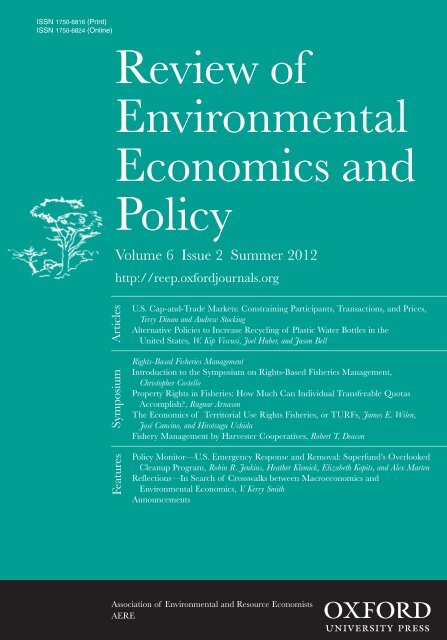碳定价工具的相对优势:税收与交易
IF 6.6
3区 经济学
Q1 ECONOMICS
引用次数: 15
摘要
大多数经济学家普遍认为,对于任何能够在大型复杂经济体中实现有意义且具有成本效益的二氧化碳减排的政策来说,经济范围内的碳定价都是必要的(尽管不一定是充分的)组成部分。但是,对于两种碳定价工具中哪一种更好,人们的意见并不一致。一些人支持碳税,而另一些人则支持限额与交易。这两种定价方法比较起来如何?在对理论和经验的调查和综合中,我表明,当碳税和碳限额与交易制度的设计方式使它们真正具有可比性时,它们的特征和结果是相似的,在某些方面是完全等同的。但这两种方法在某些特定方面的表现可能截然不同,有时倾向于税收,有时倾向于总量管制与交易。性能上的关键差异取决于程序设计的细节。事实上,乍一看似乎是在两种截然不同的工具之间的二分选择,结果可能是在政策连续体中对特定设计元素的选择。本文章由计算机程序翻译,如有差异,请以英文原文为准。
The Relative Merits of Carbon Pricing Instruments: Taxes versus Trading
There is widespread agreement among most economists that economy-wide carbon pricing will be a necessary (although not necessarily sufficient) component of any policy that can achieve meaningful and cost-effective CO2 reductions in large, complex economies. But there is less agreement about which of two carbon pricing instruments will be better. Some support carbon taxes, while others favor cap-and-trade. How do these two pricing approaches compare? In this survey and synthesis of theory and experience, I show that when carbon taxes and carbon cap-and-trade systems are designed in ways that make them truly comparable, their characteristics and outcomes are similar and, in some respects, fully equivalent. But the two approaches can perform quite differently along some specific dimensions, sometimes favoring taxes and sometimes cap-and-trade. The key differences in performance depend on details of program design. Indeed, what appears at first glance to be a dichotomous choice between two distinct instruments can turn out to be a choice of specific design elements along a policy continuum.
求助全文
通过发布文献求助,成功后即可免费获取论文全文。
去求助
来源期刊
CiteScore
10.80
自引率
0.00%
发文量
25
期刊介绍:
The Review of Environmental Economics and Policy fills the gap between traditional academic journals and the general interest press by providing a widely accessible yet scholarly source for the latest thinking on environmental economics and related policy. The Review publishes symposia, articles, and regular features that contribute to one or more of the following goals: •to identify and synthesize lessons learned from recent and ongoing environmental economics research; •to provide economic analysis of environmental policy issues; •to promote the sharing of ideas and perspectives among the various sub-fields of environmental economics;

 求助内容:
求助内容: 应助结果提醒方式:
应助结果提醒方式:


